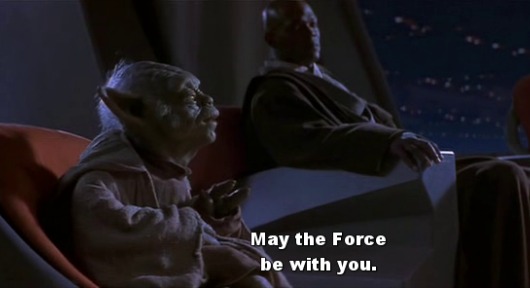And it's one of the main reasons for a screenplay to get tossed instead of read ?
So, if you wonder if YOU broke any of these 13 rules, or how you can write an original dialogue, check this series of articles.
It's practical and full of movie scripts and video examples.

We asked our dialogue expert, David, aka Blablator, to lead us through the 13 movie dialogue rules.
If you missed the first five parts of this series, you may want to check them out first.
Here is the link to Part 1, where it all started.
What a script!:
What do you mean with this rule #11 "Don't love me back"?
Blablator:
A movie dialogue is meant to fulfill specific functions. And to do that effectively.
It may however happen that some screenwriters go through the motions while writing movie dialogue.
The result? poor and predictable lines.
I have a quiz for you to illustrate what I mean. It's called: Guess what's next!
I'll start 5 sentences and your job is to guess how they end. Ready?
Did you guess right? Check the results here
My best score was to guess 7 lines in a TV serie.
Needless to say I was both horrified ... and very proud of my performance.
My point is: do not write lines that the reader could expect.
It's a sign your screenplay will not be above average, which is a deal breaker for the reader.
He may as well toss your movie script and start with another one. Possibly more promising.
What a script!
How to write unexpected movie dialogue?
Blablator
Apply these movie dialogue rules:
POLEXIA APHRODISIA Forgive me father, for I may sin tonight.2. We've all seen scenes when a character finally declares his love and says the expected "I can't live without you".
SARAH I didn't come here to tell you that I can't live without you. I can live without you. I just don't want to.
The phrase got used in many episodes to wish luck or good will, especially to someone facing some imminent challenge.
Another famous example comes from Donnie Brasco (screenplay written by Paul Attanasio ), and the use of the expression "forget about it", pronounced "fuhgeddaboudit", combined with the "repetition" movie dialogue technique.

This is a short extract from Good Will Hunting written by Matt Damon & Ben Affleck.
Skylar and Will are in bed. She caresses his back gently and tells him she wants him to come with her to California where she will study.
Will gets upset as he's afraid that Skylar will dump him after a while and he will end up on his own over there. She then says to him:
SKYLAR (beat) Look, Will if you're not in love with me, you can say that.What would be expected from Will is something along these lines: "C'mon Skylar, you know I love you." But that would be inconsistent with who he is at that moment of the screenplay.
WILL I'm not sayin' I'm not in love with you.A fight follows about Will's fear and ends up with these lines.
SKYLAR ... I just want to be with you. I love you. I love you!Will does not say the expected "I love you too", which would release the tension. Instead ...
Will, full of self-loathing, raises his hand to strike her. WILL Don't bullshit me! Don't fuckin' bullshit me! SKYLAR (standing up to him) You know what I want to hear? I want to hear that you don't love me. If you tell me that, then I'll leave you alone. I won't ask any questions and I won't be in your life. A beat. Will looks Skylar dead in the eye. Lowers his hand. WILL I don't love you. He walks out.Again, Will cannot say "I love you too". This would be inconsistent with who he is and his view of life. Check the movie dialogue rule about knowing your characters to find out more about it.
This is the whole breakup scene in Good Will Hunting that my good friend Jason, aka BAM! dissected for us.
The answers to the questions are:
One: "I love you too"
Two: "I know"
Three: "you can call me Frank"
Four: "it felt good"
Five: "I was saving you"
You've got other favorite predictable responses you heard a "zillionth time" and want to share them? drop us a line and we might just add them here.
Go back to the quiz to read further.

Pictures and screenplay extracts:
-- "Star Wars: Episode I - The Phantom Menace" - Yoda, Samuel L. Jackson, George Lucas (director), David Tattersall (director of photography), George Lucas (screenplay)
-- "Donnie Brasco" - Johnny Dep (Donnie), Paul Giamatti (FBI technician), Tim Blake Nelson (FBI technician), Mike Newell (director), Peter Sova (director of photography), Paul Attanasio (screenplay)
-- "Almost Famous" - Cameron Crowe (screenplay)
-- "Rumour has it" - Ted Griffin (screenplay)
-- "Good Will Hunting" - Matt Damon (Will Hunting), Minnie Driver (Skylar), Gus van Sant (director), Jean Yves Escoffier (director of photography), Matt Damon and Ben Affleck (screenplay)
Go from 13 Movie Dialogue Rules (part 6) to Whatascript! Home page
* "Forrest Gump", screenplay written by Eric Roth